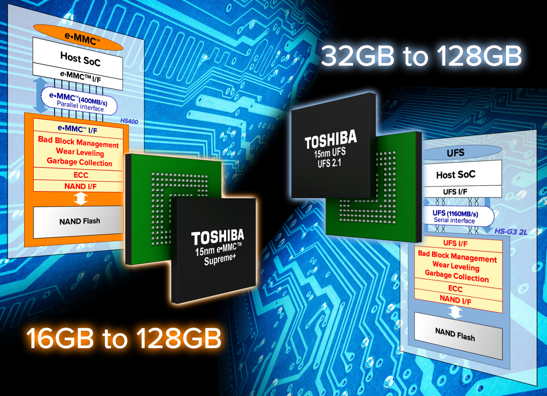Toshiba e•MMC and UFS NAND Embedded Memories With Updated Controllers
Boosting R/W speed and up to 128GB memory capacity
This is a Press Release edited by StorageNewsletter.com on November 4, 2016 at 2:38 pmToshiba Electronics Europe GmbH (TEE) has launched e•MMC[1] and UFS NAND flash embedded memories that use enhanced integrated controller technologies to deliver read and write speed improvements in demanding applications.

In contrast to ‘raw’ NAND flash memory solutions, e•MMC (Embedded Multimedia Card) and UFS (Universal Flash Storage) devices combine flash memory and the corresponding controller in a single package. This saves space and relieves host processors of the burden of key memory management functions including bad block management, error correction, wear levelling and garbage collection. As a result, e•MMC and UFS devices are easier to design in to systems than standalone memory ICs with a standard NAND Flash interface.
‘Supreme+’ e•MMC (JEDEC ver. 5.1) memories are available in capacities from 16 to 128GB and are based on 15nm MLC NAND flash technology. Sequential read and write speeds of 320MB/s and 180MB/s are around 2% and 20% faster than the read and write speeds of firm’s previous devices [2]. Also, random read and write speeds are around 100% and 140% better than previous devices [2].
While e•MMC reaches a theoretical limit with an 8-bit parallel interface of 400MB/s, UFS memory extends interface performance through high-speed differential signaling using the MIPI [3] M-PHY interface. This results in a theoretical performance of 1,166MB/s by supporting a two-lane MIPI M-PHY HS-G3 interface.
The UFS (JEDEC ver 2.1) devices are also based on 15nm MLC NAND flash technology and can be supplied with capacities from 32 to 128GB. Compared to previous devices sequential read and write speeds of 850MB/s and 180MB/s represent improvements of around 40% and 16% [2]. Also, random read and write performances are around 120% and 80% better respectively [2].
The company manufactures both the flash memory and the controller technology deployed in its e.MMC and UFS memory devices. It also developed in-house the analogue M-PHY 3.0 core and digital UniPro 1.6 core that are integrated with the UFS controller. As a result, the controller is closely matched to the requirements of managing the target flash memory, which ensures optimised device performance.
[1] e•MMC is a trademark of JEDEC/MMCA.
[2] Based on comparing the top performances of new and previous generation devices.
[3] MIPI is a registered trademark of MIPI Alliance Inc.












 Subscribe to our free daily newsletter
Subscribe to our free daily newsletter
